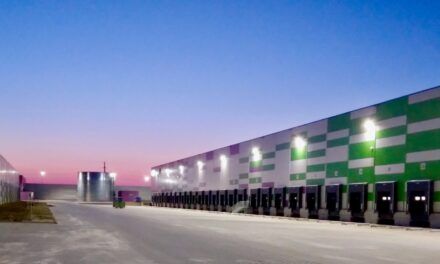According to Savills, investment into the European logistics sector has again remained strong so far in 2022, reaching €14.3bn in the first quarter, following a record year in 2021. A shortage of prime stock has driven up prime warehouse rents, with significant increases observed in London (+20%).

In Poland, the highest rental levels have been noted in Warsaw, where, as a result of the strong upward pressure observed since the beginning of the current year, the range of rental increases trend to follow the UK trend.
The largest investment volumes have been observed in Germany (€4.1bn), outperforming the UK (€2.9bn), and altogether accounting for almost 50% of total European activity in the first quarter. The Netherlands (€2.0bn) and France (€1.1bn) also recorded strong levels of investment in Q1 2022.
Marcus de Minckwitz, Head of Industrial & Logistics, Savills EMEA, comments, “The main drivers behind the sector’s stellar growth continue to be the post pandemic e-commerce boom across the continent and, more recently, in light of geopolitical crises, the race for additional warehouse space to secure international company supply chains.”
With 10 million sq m of warehouse space leased across Europe in Q1, take-up is 28% above the five year average and Germany (2.4m sq m), the Netherlands (2.2m sq m), Poland (1.5m sq m) and the UK (1.3m sq m) have driven the majority of leasing activity so far this year.
Savills European Logistics Census 2021 indicated that the biggest change occupiers anticipate as a result of the pandemic is the shortening, or reshoring, of supply chains to mitigate risk. The supply chain challenges resulting from the war in Ukraine and China’s latest lockdowns have further driven demand to record levels in Poland, for example, where leasing activity has reached an all time high this quarter.
Following a record decline in vacancy rates in 2021, undersupply across the continent will also continue to reinforce investor appetite for industrial assets, says Savills. Dublin (1.1%), Denmark (1.5%), Barcelona (1.7%), Czech Republic (2.0%), the UK (2.7%), Poland (3,05%) and the Netherlands (3.2%) continue to be among some of the most undersupplied markets.
In a similar manner to 2021, this unprecedented shortage of prime stock has applied upwards pressure on prime rents, with an average increase of 5.9% recorded over the past 12 months.
The weight of capital still targeting European logistics has compressed average prime yields by 23bps to 4.08% in the last six months, says Savills. Sweden hardened by 65bps, Finland and Italy by 40bps and 35bps respectively. Belgium, Czech Republic, Denmark, France and Norway hardened by 25bps. Germany hardened by 20bps and the Netherlands by 10bps. The UK, Ireland and Portugal were the only markets to remain stable.
For those investors still seeking product in key markets, Savills has recorded that there has been strong levels of European development in Q1 2022, with Poland’s logistics stock increasing by 16.5% yoy, and Madrid (11.6%), the Netherlands (8.8%) and the UK (5.5%) all observing strong levels of deliveries over the previous year.
 John Palmer, Head of Industrial Investments at Savills in Poland comments: “A response to the negative impact of rising debt on investors is that today Poland is entering into a phase of rapid rental growth not experienced before. Rents are moving sharply higher and developer’s offers to occupiers are showing a 20 percent uptick. Coupled with that existing leases will now benefit from indexation linked rental increases that should encourage the purchase of income producing assets.”
John Palmer, Head of Industrial Investments at Savills in Poland comments: “A response to the negative impact of rising debt on investors is that today Poland is entering into a phase of rapid rental growth not experienced before. Rents are moving sharply higher and developer’s offers to occupiers are showing a 20 percent uptick. Coupled with that existing leases will now benefit from indexation linked rental increases that should encourage the purchase of income producing assets.”
Kevin Mofid, Head of Industrial & Logistics Research, Savills EMEA, concludes, “Our outlook is still extremely positive for the year ahead. All of the metrics looking at the occupational market remain strong with vacancy trending downward and take-up trending upwards. Compared with other sectors, the fundamentals around logistics remain strong. With this in mind, we anticipate logistics investment transactions in the region of €60bn to be completed this year, comparable to last year’s record setting €62bn.”


























